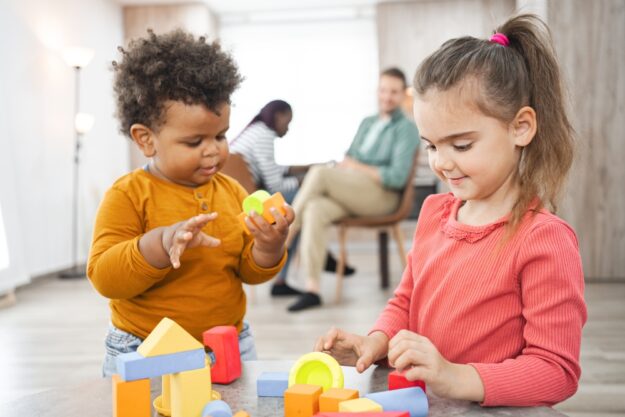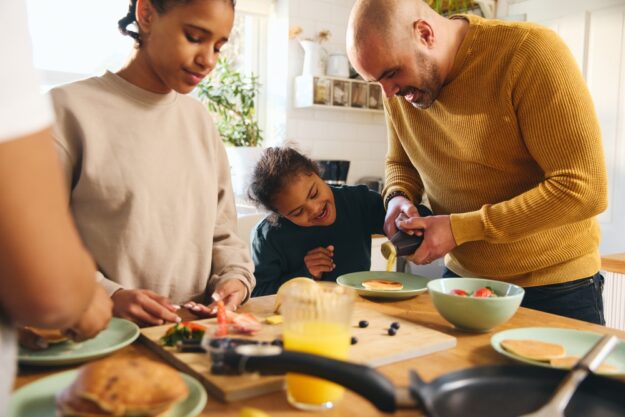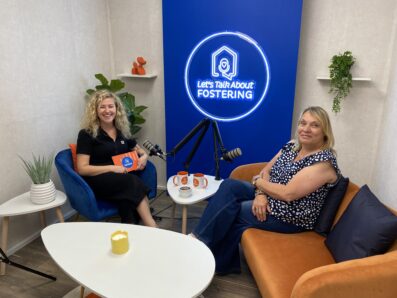Children and young people in care need a positive home environment to thrive. But what does that really mean?
It’s more than just providing a spare room, removing hazards, and completing risk assessments. It’s about giving them the space to be themselves, build beautiful connections, achieve academically, and work towards a happier future.
But how do you do it? If you’re thinking about welcoming a foster child into your home, join us as we explore how, as a foster parent, you can create a nurturing and positive home environment for children in your care.

What is a positive home environment?
A positive home environment helps foster children feel safe, stable, and loved – it’s a foundation that can help them rebuild their self-esteem, realise their worth, and reach their full potential.
Many children and young people in care have lived in unstable households where they were victims of abuse or neglect. These experiences can leave them with trauma.
From struggling to trust others and building connections to having difficulty regulating emotions and vocalising their thoughts and feelings, trauma can affect every aspect of their life and well-being.
That’s why it’s so important that children and young people in care live with foster families who create a positive home environment. So they can begin their healing journey in a space where not only are their needs met, but also where they feel seen, heard and accepted for who they are.
How to create a positive home environment
It doesn’t matter which type of foster care you provide, whether it be long-term, emergency or parent and child fostering, creating a positive environment at home can make a significant difference to every child, regardless of how long they stay with you. Here are our tips to help you get started.
Establish a good routine
It doesn’t matter how old you are, whether you like to admit it or not, your routine probably brings you some comfort, even if you’d like to escape it from time to time.
Routines help us feel safe and stable because we know what’s going to happen next. They bring structure to our lives, helping us balance various commitments and keep on top of to-do lists. But one of the best things about routines is that they can ease anxiety.
A positive home environment includes a good routine. When everyone in the home knows what’s going to happen and when, it prevents chaos and promotes a sense of stability. Good routines include regular mealtimes and bedtimes, along with time for:
- Self-care
- Hobbies
- Interests
- After-school activities
- Homework
- Family time arrangements
- Meetings and appointments
- Exercise
- Friends
- Family bonding
Continuously nurture your relationship
We learn how to relate to others through the interactions we have with our caregivers. If a child has experienced abuse or neglect, they may have had to adapt their behaviour and the way they relate to others to protect themselves from harm and have their needs met. When they move into care, they may continue to use these behaviours because they’ve become deep-rooted and make them feel safe.
For example, if your foster child was punished for showing their emotions, they may have learned that it’s safer to keep their thoughts and feelings locked away. If they were neglected, they may have found the only way to have their needs met was by staying close to their caregiver.
When they move into your home, it’ll take time for them to trust that their thoughts, feelings, and needs are safe with you. This means you’ll need to continuously nurture your relationship and show them that you can be trusted by:
- Being consistent and doing the things you say you will.
- Letting them know that you are always there for them and proving it.
- Looking beyond their behaviour to understand what’s really going on and taking steps to support them.
- Teaching them how to manage their emotions.
- Showing them that you accept them for who they are and reassuring them that you won’t leave them.
- Making regular time for them, such as reading them a story or watching their favourite TV show together every night.
Help them feel like part of the family
Moving into care can feel very disorientating for children and young people as they leave everything they’ve ever known behind and begin living with a new family.
They might struggle to know where they belong, but as a foster parent, you can help them by making them feel like part of your family. You can do this by:
- Having a family photo and displaying it in the home.
- Taking your foster child on holiday with you and your children.
- Involving them in special events, such as birthday celebrations.
- Letting them meet your extended family.
- Displaying pictures they’ve drawn at school or pieces of work they’re proud of on the fridge.
- Allocating chores to them, such as feeding the dog or taking out the bins.
- Encouraging them to make decisions, such as where you’ll go on your next family day out.
Advocate for their needs
As a child or young person, when the chips are down, it’s nice to know that someone has your back. This may be something your foster child has never experienced before, but advocating for them creates a supportive home environment.
Whether it be their health, education, or care plan, as a foster parent, being your foster child’s voice until they can speak up for themselves ensures they receive the right support, no matter the situation. It can also go a long way in demonstrating to the child in your care that if they have a problem, they can always rely on you to help them through it.
Let them have a say
From the painful experiences they’ve been through to moving into care, foster children have often had little say in the decisions made about their lives.
As a result, they may crave a sense of autonomy and control over some aspects of their lives. Positive home environments empower children and young people to make some decisions for themselves.
Whether it’s what they have for dinner, when they do their homework, or what movie you’ll watch together, giving your foster child some control over decisions can improve their confidence, nurture their self-esteem, and prepare them for life after foster care.
Encourage them to explore their interests
Education is important, but if your foster child is struggling at school, putting too much emphasis on how it impacts their future could leave them feeling hopeless, affecting their confidence and self-worth.
Everyone is good at something, and positive home environments give foster children the space to discover what that something is. Whether it be sports, music, art, or something else, encourage your foster child to explore their interests; you never know where it might lead.
Supporting a positive home environment
At FCA, we’ve been helping foster parents build positive home environments for over 30 years. We do this by:
- Providing extensive training that teaches you how to meet foster children’s physical, emotional, educational, social and behavioural needs.
- Offering 24/7 support so you can reach out for advice and guidance whenever you need it.
- Giving you access to fostering specialists who help you care for foster children’s entire well-being, such as therapists, education coordinators, social workers, and more.
- Organising support groups, meet-ups, activities and events, so you and your family can build connections with local foster families, giving you more people to lean on.
- Having a dedicated participation team that encourages children to get involved, build life skills, and plan for the future.
- Giving our children a platform to share their experiences with the leadership team through our Young People’s Forum.
We’re a community that shares the same purpose – to safeguard children and young people, help them have a happy childhood, and prepare them for a fulfilling future.
Join our mission to change children’s lives
Ready to start a career where you can truly make a difference? Call us on 0800 098 4148 or submit an enquiry form to learn more about becoming a foster parent.
You can also find out what it’s really like to foster by reading our latest fostering stories or by checking out our blogs, which cover every aspect of foster parent life.






